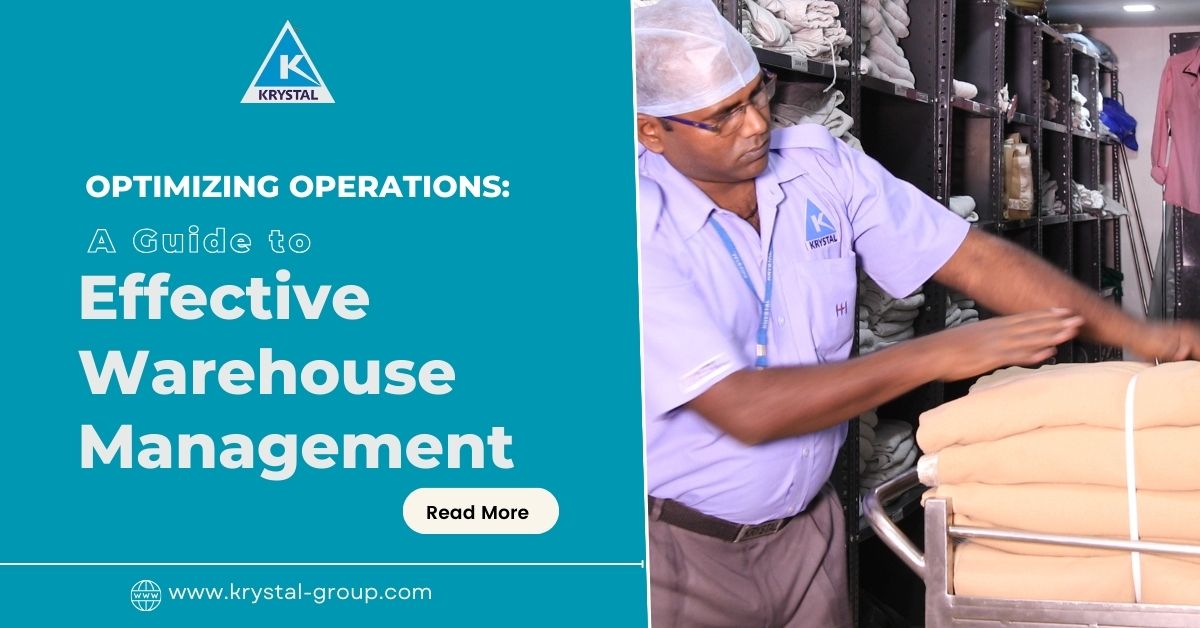Optimizing Operations: A Guide to Effective Warehouse Management
14 February 2024

Introduction:
In the fast-paced world of logistics and supply chain management, the efficiency of Warehouse Management is paramount. Understanding the key principles of effective warehouse management is essential for promoting streamlined processes, reducing costs, and ultimately enhancing customer satisfaction. Let’s delve into a comprehensive guide on optimizing operations in warehouse management.

1. Strategic Layout and Organization:
A well-organized warehouse starts with a strategic layout. Efficiently organizing storage areas, picking zones, and shipping areas reduces the time it takes to locate and retrieve items. Employing a systematic approach, such as the use of bin locations and marked aisles, contributes to a smoother workflow.
2. Warehouse Management Systems:
Implementing advanced inventory management systems is a game-changer. Utilize digital tools and software that provide real-time visibility into stock levels, track item movements, and automate reorder processes. This not only minimizes the risk of stockouts but also prevents overstock situations, optimizing overall inventory performance.
3. Technology Integration:
Leverage technology to enhance warehouse management. Incorporate barcode scanning, RFID technology, and automated data capture systems to streamline processes like order picking and packing. These technologies not only reduce errors but also accelerate the pace of operations, ultimately boosting productivity.
4. Employee Training and Engagement:
Well-trained and engaged employees are crucial for effective warehouse management. Provide comprehensive training on warehouse processes, safety protocols, and the use of technology. Foster a culture of continuous improvement, encouraging employees to share insights on optimizing workflows and resolving operational challenges.
5. Data Analytics for Decision-Making:
Harness the power of data analytics to make informed decisions. Analyzing historical data helps in identifying trends, forecasting demand, and optimizing storage configurations. By leveraging data, warehouse managers can make strategic decisions to enhance overall operational efficiency.
6. Supplier Collaboration and Communication:
Effective communication with suppliers is vital for smooth warehouse operations. Maintain open lines of communication to ensure timely deliveries and accurate order fulfillment. Collaborate with suppliers to implement efficient receiving processes, reducing lead times and enhancing overall supply chain performance.
7. Order Fulfillment by Warehouse Management:
Streamlining the order fulfillment process is crucial for meeting customer expectations. Implement order batching, wave picking, and efficient packing procedures to reduce order processing times. This not only improves customer satisfaction but also contributes to cost savings in the long run.
8. Warehouse Management Measures:
Integrate robust quality control measures into warehouse management. Regularly inspect and audit inventory to identify and rectify discrepancies. Implementing stringent quality checks ensures that only accurate and defect-free products are dispatched, minimizing returns and customer dissatisfaction.
9. Sustainability Initiatives:
Consider incorporating sustainable practices into warehouse operations. From energy-efficient lighting to eco-friendly packaging, implementing green initiatives not only aligns with environmental responsibility but can also lead to cost savings and improved brand perception.
9. Continuous Monitoring and Improvement:
The key to long-term success in warehouse management lies in continuous monitoring and improvement. Regularly assess key performance indicators (KPIs), seek feedback from staff, and proactively identify areas for enhancement. A culture of continuous improvement ensures that warehouse operations stay agile and adaptable to evolving business needs.
Conclusion:
Optimizing warehouse operations is a multifaceted endeavor that requires a strategic blend of technology, employee engagement, and process refinement. As a digital marketer, understanding the nuances of effective warehouse management equips you to communicate the value of streamlined operations, cost efficiency, and enhanced customer satisfaction—a trifecta crucial for success in today’s competitive business landscape.
Similar articles

How Krystal Group's Payroll Management Services Can Boost Your Business Growth
Krystal Group, a leading provider of payroll management services, understands the critical role that payroll plays in the success of...
Read More
Payroll Management Services in India
Krystal Group simplifies payroll management. Payroll Management Services in India are fully automated by our strong back-end payroll engine. “KRYSTAL...
Read More
Payroll Management: The Ultimate Guide – Krystal Group
Krystal Group provides Payroll management services. Payroll management is a critical function within any organization, encompassing a wide range of...
Read More